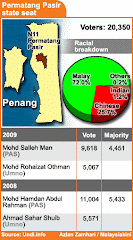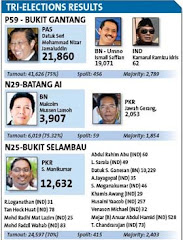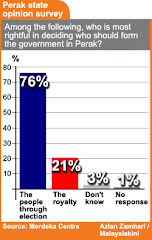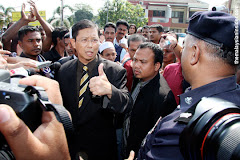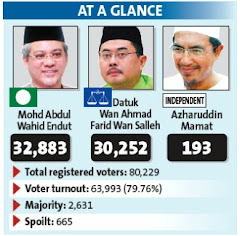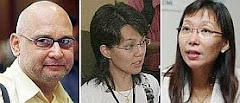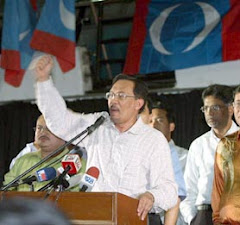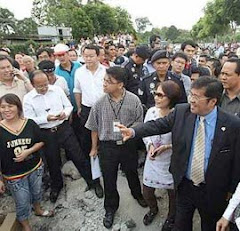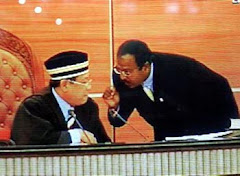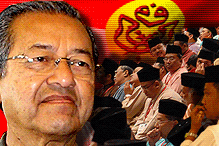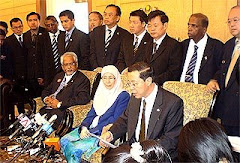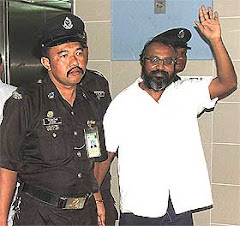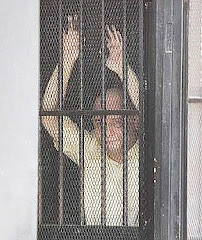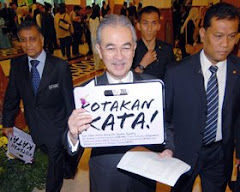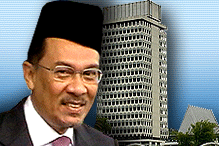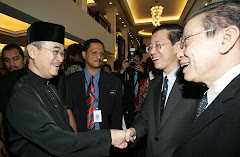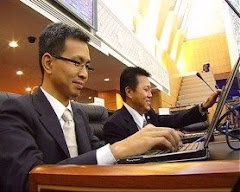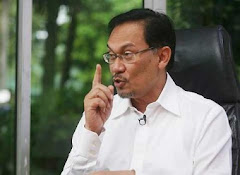Thursday, September 10, 2009
Wednesday, September 9, 2009
Speaker vs Speaker: Judge slapping his own face? - Malaysiakini
By Kim Quek Sep 9, 09 4:55pm
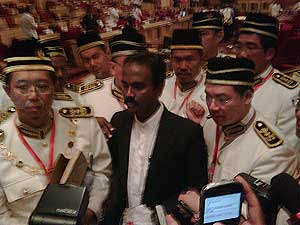 A tragic yet hilarious court proceeding took place in the Ipoh High Court on Sept 8 when the judge blatantly contradicted himself in dismissing a suit brought by Perak's Pakatan Rakyat speaker against the state's Barisan Nasional speaker (yes, two speakers in the Perak assembly).
A tragic yet hilarious court proceeding took place in the Ipoh High Court on Sept 8 when the judge blatantly contradicted himself in dismissing a suit brought by Perak's Pakatan Rakyat speaker against the state's Barisan Nasional speaker (yes, two speakers in the Perak assembly).
Judge Azahar Mohamed rejected V Sivakumar's suit to seek damages from R Ganesan for assault and false imprisonment during the chaotic and violent state assembly sitting on May 7.
He said the court had no jurisdiction to hear the case due to Federal Constitution Article 72 stipulating that "the validity of any proceeding in any state assembly cannot be questioned in any court".
And yet in the same breath he declared that "the decision of the legislative assembly to remove the plaintiff as speaker and to appoint the defendant was conclusive and had been fairly determined by the state assembly on May 7, 2009."
Now, the crux of the entire contention between the two speakers is: Who is on the right side of law in the violent tussle for the speaker's chair on May 7?
By declaring Ganesan as the rightful speaker, Judge Azahar is in fact making a legal judgment. Is that not a breach of Article 72? How come he has no jurisdiction to hear Sivakumar's grievances but has jurisdiction to judge Ganesan as legal speaker?
Is that not a contradiction of the highest order?
Apart from this atrocious double standard applied by the judge, the main flaw of the judgment is the inability to differentiate between assembly proceeding and criminal behaviour.
What Sivakumar is seeking is redress for the unlawful physical violence inflicted on him. And Article 72 covers only businesses conducted in the assembly - not unlawful and criminal act.
Judge Azahar has therefore wrongly used Article 72 to come to his judgment. To make it very clear that this is the case, I will quote in full the relevant clauses in Article 72 (Clauses 1 & 2) and explain the reasons why.
* Clause 1: The validity of any proceedings in the Legislative Assembly of any State shall not be questioned in any court.
* Clause 2: No body shall be liable to any proceedings in any court in respect of anything said or vote given by him when taking part in proceedings of the Legislative Assembly of any State or of any committee thereof.
Note the operative words "proceedings" in Clause 1 and "anything said or any vote given" in Clause 2. It is abundantly clear what Article 72 refers to are the speeches and resolutions made in the assembly, not any criminal or unlawful act.
Tragedy and comedy
But what happened on May 7 was complete pandemonium and chaos in the assembly hall. There was no chance to conduct any business at all, least of all any resolution passed. In fact, the only business done on that day was the address by the Perak Regent Raja Nazrin Shah.
And how was Sivakumar "replaced" by Ganesan during that pandemonium?
While Sivakumar was sitting in the speaker's chair, hordes of police personnel entered the assembly hall, allegedly on Ganesan's order, and physically lifted, carried, dragged and moved speaker Sivakumar into a room where he was forcibly detained until the assembly sitting was over.
And as soon as Sivakumar was removed from the hall, police personnel escorted Ganesan into the hall and ushered him to the speakers chair, with police personnel making a line to stand guard in front of Ganesan to prevent any assemblymen from reaching the speaker's chair.
The entire tragedy-comedy was stage-managed by the police, and it is therefore more appropriate to say that while Sivakumar was elected by the assembly through a resolution, Ganesan was physically planted into the speaker's chair by the police. And that about sums up what happened on that tragic-hilarious day.
And since Judge Azahar appears to be so respectful of the constitutional principle of separation of power as demonstrated by his professed adherence to Article 72, is it not puzzling that he should have chosen to ignore completely the heinous violation of the doctrine of separation of power when hordes of police personnel invaded the assembly to physically replace one speaker with another?
Is it not another shining example of double standard in the Malaysia Boleh tradition?
After the series of judicial decisions that appear to wantonly trample the constitution and the law following the shameful power grab in Perak, the latest low represented by Azahar's decision makes us wonder how much lower our judiciary can sink into, as many more judicial decisions in the same series are still pending.
 A tragic yet hilarious court proceeding took place in the Ipoh High Court on Sept 8 when the judge blatantly contradicted himself in dismissing a suit brought by Perak's Pakatan Rakyat speaker against the state's Barisan Nasional speaker (yes, two speakers in the Perak assembly).
A tragic yet hilarious court proceeding took place in the Ipoh High Court on Sept 8 when the judge blatantly contradicted himself in dismissing a suit brought by Perak's Pakatan Rakyat speaker against the state's Barisan Nasional speaker (yes, two speakers in the Perak assembly).Judge Azahar Mohamed rejected V Sivakumar's suit to seek damages from R Ganesan for assault and false imprisonment during the chaotic and violent state assembly sitting on May 7.
He said the court had no jurisdiction to hear the case due to Federal Constitution Article 72 stipulating that "the validity of any proceeding in any state assembly cannot be questioned in any court".
And yet in the same breath he declared that "the decision of the legislative assembly to remove the plaintiff as speaker and to appoint the defendant was conclusive and had been fairly determined by the state assembly on May 7, 2009."
Now, the crux of the entire contention between the two speakers is: Who is on the right side of law in the violent tussle for the speaker's chair on May 7?
By declaring Ganesan as the rightful speaker, Judge Azahar is in fact making a legal judgment. Is that not a breach of Article 72? How come he has no jurisdiction to hear Sivakumar's grievances but has jurisdiction to judge Ganesan as legal speaker?
Is that not a contradiction of the highest order?
Apart from this atrocious double standard applied by the judge, the main flaw of the judgment is the inability to differentiate between assembly proceeding and criminal behaviour.
What Sivakumar is seeking is redress for the unlawful physical violence inflicted on him. And Article 72 covers only businesses conducted in the assembly - not unlawful and criminal act.
Judge Azahar has therefore wrongly used Article 72 to come to his judgment. To make it very clear that this is the case, I will quote in full the relevant clauses in Article 72 (Clauses 1 & 2) and explain the reasons why.
* Clause 1: The validity of any proceedings in the Legislative Assembly of any State shall not be questioned in any court.
* Clause 2: No body shall be liable to any proceedings in any court in respect of anything said or vote given by him when taking part in proceedings of the Legislative Assembly of any State or of any committee thereof.
Note the operative words "proceedings" in Clause 1 and "anything said or any vote given" in Clause 2. It is abundantly clear what Article 72 refers to are the speeches and resolutions made in the assembly, not any criminal or unlawful act.
Tragedy and comedy
But what happened on May 7 was complete pandemonium and chaos in the assembly hall. There was no chance to conduct any business at all, least of all any resolution passed. In fact, the only business done on that day was the address by the Perak Regent Raja Nazrin Shah.
And how was Sivakumar "replaced" by Ganesan during that pandemonium?
While Sivakumar was sitting in the speaker's chair, hordes of police personnel entered the assembly hall, allegedly on Ganesan's order, and physically lifted, carried, dragged and moved speaker Sivakumar into a room where he was forcibly detained until the assembly sitting was over.
And as soon as Sivakumar was removed from the hall, police personnel escorted Ganesan into the hall and ushered him to the speakers chair, with police personnel making a line to stand guard in front of Ganesan to prevent any assemblymen from reaching the speaker's chair.
The entire tragedy-comedy was stage-managed by the police, and it is therefore more appropriate to say that while Sivakumar was elected by the assembly through a resolution, Ganesan was physically planted into the speaker's chair by the police. And that about sums up what happened on that tragic-hilarious day.
And since Judge Azahar appears to be so respectful of the constitutional principle of separation of power as demonstrated by his professed adherence to Article 72, is it not puzzling that he should have chosen to ignore completely the heinous violation of the doctrine of separation of power when hordes of police personnel invaded the assembly to physically replace one speaker with another?
Is it not another shining example of double standard in the Malaysia Boleh tradition?
After the series of judicial decisions that appear to wantonly trample the constitution and the law following the shameful power grab in Perak, the latest low represented by Azahar's decision makes us wonder how much lower our judiciary can sink into, as many more judicial decisions in the same series are still pending.
Friday, September 4, 2009
EC acted beyond powers in not holding polls in Perak, court told
Sept 4, 2009
KUALA LUMPUR: The Election Commission (EC) acted beyond its powers and functions in not holding by-elections for three state seats in Perak, the High Court here was told Friday.
Counsel Datuk S. Ambiga said the EC's decision in holding that the state assembly seats of Behrang, Changkat Jering and Jelapang were not vacated as a result of the resignation of the three assemblymen, as determined by the then speaker of the state assembly V. Sivakumar, was illegal and irrational.
"The fourth respondent (the EC) had usurped the powers and right of the speaker (Sivakumar) to determine that a resignation had taken place," argued Ambiga before Justice Lau Bee Lan in her chambers.
Ambiga, former president of the Bar Council, was representing Sivakumar in his leave application for a judicial review to compel the EC to declare the three seats vacant and hold by-elections.
In his application, Sivakumar had named state assemblymen Jamaluddin Mohd Radzi (Behrang), Mohd Osman Mohd Jailu (Changkat Jering) and Hee Yit Foong (Jelapang), and the EC as respondents.
Ambiga, in her submission, also contended that the EC, by its letter to Sivakumar dated Feb 5, 2009, had stated that it was unable to ascertain whether the three seats had been vacated and, therefore, could not call for by-elections.
"Having determined that it could not ascertain that a vacancy had occurred, the EC had contrarily made a decision that the three seats were still held by the first to third respondents," she said.
Sivakumar, 38, is seeking a court order to quash the EC's decision and to compel the EC to hold by-elections in the Behrang, Changkat Jering and Jelapang state constituencies.
He also wants the court to grant an injunction to stop Jamaluddin, Mohd Osman and Hee from acting as and carrying out the functions and duties of assemblymen of the respective state seats.
He is also seeking a writ of "quo warranto" to compel the trio to show under what basis or authority they still remained the elected representatives of their constituencies and carried out the responsibilities, functions and duties of an assemblyman.
The court fixed Sept 9 to hear the reply from the EC, represented by Senior Federal Counsel Datuk Kamaludin Md Said. - Bernama
KUALA LUMPUR: The Election Commission (EC) acted beyond its powers and functions in not holding by-elections for three state seats in Perak, the High Court here was told Friday.
Counsel Datuk S. Ambiga said the EC's decision in holding that the state assembly seats of Behrang, Changkat Jering and Jelapang were not vacated as a result of the resignation of the three assemblymen, as determined by the then speaker of the state assembly V. Sivakumar, was illegal and irrational.
"The fourth respondent (the EC) had usurped the powers and right of the speaker (Sivakumar) to determine that a resignation had taken place," argued Ambiga before Justice Lau Bee Lan in her chambers.
Ambiga, former president of the Bar Council, was representing Sivakumar in his leave application for a judicial review to compel the EC to declare the three seats vacant and hold by-elections.
In his application, Sivakumar had named state assemblymen Jamaluddin Mohd Radzi (Behrang), Mohd Osman Mohd Jailu (Changkat Jering) and Hee Yit Foong (Jelapang), and the EC as respondents.
Ambiga, in her submission, also contended that the EC, by its letter to Sivakumar dated Feb 5, 2009, had stated that it was unable to ascertain whether the three seats had been vacated and, therefore, could not call for by-elections.
"Having determined that it could not ascertain that a vacancy had occurred, the EC had contrarily made a decision that the three seats were still held by the first to third respondents," she said.
Sivakumar, 38, is seeking a court order to quash the EC's decision and to compel the EC to hold by-elections in the Behrang, Changkat Jering and Jelapang state constituencies.
He also wants the court to grant an injunction to stop Jamaluddin, Mohd Osman and Hee from acting as and carrying out the functions and duties of assemblymen of the respective state seats.
He is also seeking a writ of "quo warranto" to compel the trio to show under what basis or authority they still remained the elected representatives of their constituencies and carried out the responsibilities, functions and duties of an assemblyman.
The court fixed Sept 9 to hear the reply from the EC, represented by Senior Federal Counsel Datuk Kamaludin Md Said. - Bernama
Subscribe to:
Posts (Atom)
